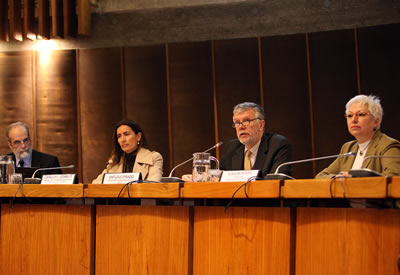Care of Dependents Must Be Shared between State and Families
Work area(s)
Currently, most of this work falls to women only. Poll of opinion makers stresses the need for public policies in Latin America and the Caribbean.

(21 August 2012) According to a study by the Economic Commission for Latin America and the Caribbean, (ECLAC), responsibility for the care of dependents (particularly children, the disabled, older adults and the sick) must be shared between the State and families, rather than being shouldered exclusively by families (and mainly women), as is the case today.
The United Nations Commission presented conclusions of the Consultation on dependent care policies in Latin America: children, older adults, the disabled and the chronically ill, which surveyed more than 500 opinion makers in several of the region's countries in March 2012.
The results indicate than over 9 in 10 of those surveyed agreed that responsibility for the care of dependents is currently borne by women in the family (94% among women surveyed, and 88% among men polled), while 95% of those consulted think that the public purse should help to finance the demand for care in their countries.
According to Antonio Prado, Deputy Executive Secretary of ECLAC: "Most of the region's opinion makers believe that care responsibilities should be shared between men and women, and that the State should be the provider of a wide range of care services".
He added along that same line that "Most of those consulted believe that current policies are not sufficient to meet care requirements, and that new policies are needed. [...] Achieving greater economic autonomy and equality in the labour market involves adopting social and economic policy measures needed to make progress in the social appreciation and recognition of the economic value of unpaid work carried out by women in the domestic and care spheres".
The Minister in charge of the Chilean National Women's Service (SERNAM), Carolina Schmidt, declared that a change of cultural mentality is required in the area of families, work and childcare, so that men and women have equal conditions and rights in society.
She stated "there is a mental association between women and the care of children, the sick and older adults, even in labour legislation. This hampers women's employability. [...] That is why we need public policies that generate better conditions for children and dependents. This is a demand for social justice".
Sonia Montaño, Director of the ECLAC Division for Gender Affairs (which was responsible for the consultation) emphasized that social and institutional change helps with the cultural change needed in these areas: "The changes needed to achieve equality can only be implemented by changing the prejudices that have dominated our societies for so long".
The main results of the consultation were presented by Luis Eduardo González, from the CIFRA consultancy in Uruguay, and were obtained thanks to support from the Spanish Agency for International Development Cooperation (AECID) and the Spanish Government's Directorate-General for Development Policy Planning and Evaluation (DGPOLDE).
Mr González explained that there is a favourable climate for socially tackling the issue of dependent care in the region (45% of women polled and 41% of men surveyed). He also stated that two thirds of those consulted believe that, during the next decade, care policies will tend to expand and that opinion makers are "one step ahead" in recognizing the need to develop new policies.
Any queries should be sent to the ECLAC Public Information and Web Services Section.
E-mail: prensa@cepal.org; Telephone: (56 2) 210 2040.
Follow us on: Twitter, Facebook, Flickr and YouTube.
Country(ies)
- Latin America and the Caribbean
Related project(s)
Contact
Public Information Unit
- prensa@cepal.org
- (56 2) 2210 2040
